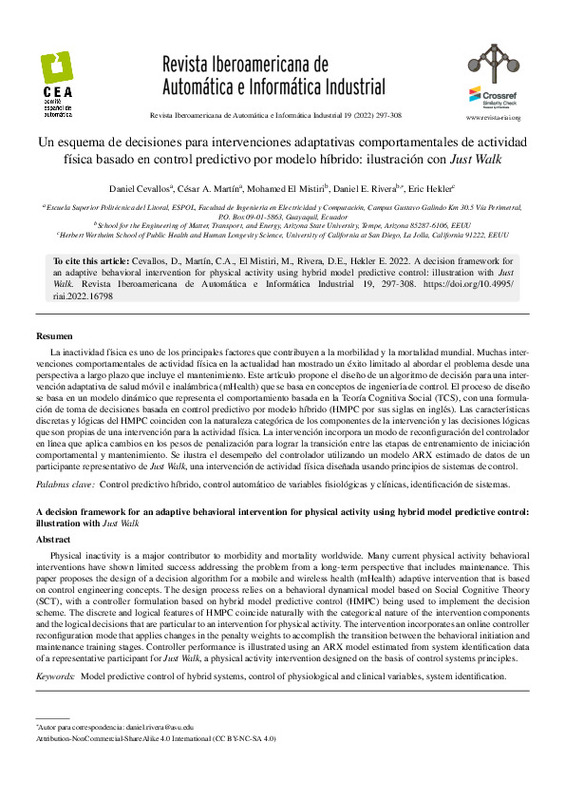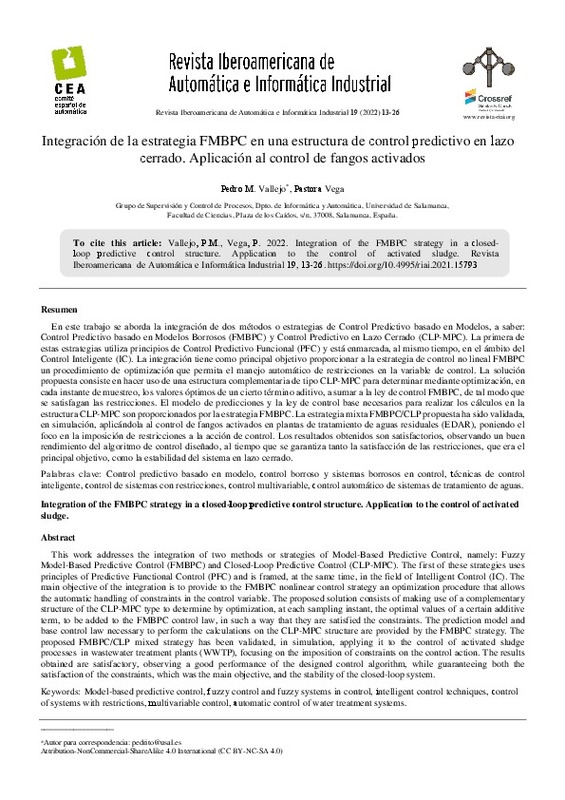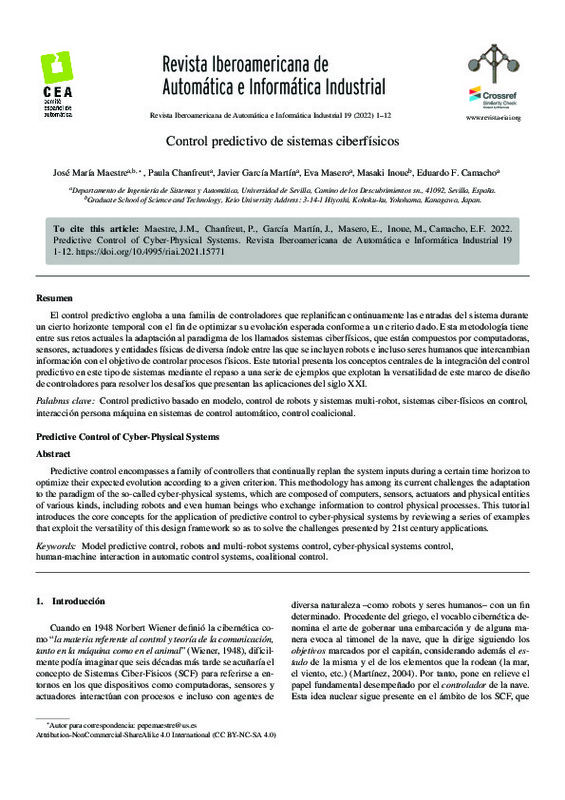Adams, M. A., Sallis, J. F., Norman, G. J., Hovell, M. F., Hekler, E. B., Perata, E., 2013. An adaptive physical activity intervention for overweight adults: A randomized controlled trial. PloS one 8 (12), e82901. https://doi.org/10.1371/journal.pone.0082901
Bandura, A., 1986. Social Foundations of Thought and Action: A Social Cognitive Theory. Prentice-Hall series in social learning theory.
Carver, C. S., Scheier, M. F., 1998. On the Self Regulation of Behavior. Cambridge University Press. https://doi.org/10.1017/CBO9781139174794
[+]
Adams, M. A., Sallis, J. F., Norman, G. J., Hovell, M. F., Hekler, E. B., Perata, E., 2013. An adaptive physical activity intervention for overweight adults: A randomized controlled trial. PloS one 8 (12), e82901. https://doi.org/10.1371/journal.pone.0082901
Bandura, A., 1986. Social Foundations of Thought and Action: A Social Cognitive Theory. Prentice-Hall series in social learning theory.
Carver, C. S., Scheier, M. F., 1998. On the Self Regulation of Behavior. Cambridge University Press. https://doi.org/10.1017/CBO9781139174794
Chen, T., Ohlsson, H., Goodwin, G. C., Ljung, L., 2011. Kernel selection in linear system identification part ii: A classical perspective. In: 2011 50th IEEE Conference on Decision and Control and European Control Conference. IEEE, pp. 4326-4331. https://doi.org/10.1109/CDC.2011.6160722
Clague, J., Bernstein, L., 2012. Physical activity and cancer. Current Oncology Reports 14 (6), 550-558. https://doi.org/10.1007/s11912-012-0265-5
Deshpande, S., Nandola, N. N., Rivera, D. E., Younger, J. W., 2014. Optimized treatment of fibromyalgia using system identification and hybrid model predictive control. Control Engineering Practice 33 (1), 161-173. https://doi.org/10.1016/j.conengprac.2014.09.011
Dong, Y., Deshpande, S., Rivera, D. E., Downs, D. S., Savage, J. S., 2014. Hybrid model predictive control for sequential decision policies in adaptive behavioral interventions. In: Proc. ACC. pp. 4198-4203. https://doi.org/10.1109/ACC.2014.6859462
El Mistiri, M., Rivera, D. E., Klasnja, P., Park, J., Hekler, E. B., 2022. Model predictive control strategies for optimized mhealth interventions for physical activity. In: 2022 American Control Conference (ACC). submitted.
Ferster, C. B., 1970. Schedules of reinforcement with Skinner. In: Dews, P. B. (Ed.), Festschrift for B. F. Skinner. Century psychology series. New York, Appleton-Century-Crofts, pp. 37-46.
Freigoun, M. T., Mart ́ın, C. A., Magann, A. B., Rivera, D. E., Phatak, S. S., Korinek, E. V., Hekler, E. B., 2017. System identification of just walk: A behavioral mhealth intervention for promoting physical activity. In: 2017 American Control Conference (ACC). pp. 116-121. https://doi.org/10.23919/ACC.2017.7962940
Guillaume, P., Schoukens, J., Pintelon, R., Kollar, I., 1991. Crest-factor minimization using nonlinear Chebyshev approximation methods. IEEE Transactions on Instrumentation and Measurement 40 (6), 982-989. https://doi.org/10.1109/19.119778
Hekler, E., 2015. Just Walk Study. http://justwalkstudy.weebly.com/, [Online; accessed September-23-2015].
Hekler, E., Rivera, D. E., 2021. Optimizing individualized and adaptive mhealth interventions via control systems engineering methods, R01CA244777: National Institute of Health, National Cancer Institute.
Hekler, E. B., Rivera, D. E., Martin, C. A., Phatak, S. S., Freigoun, M. T., Korinek, E., Klasnja, P., Adams, M. A., Buman, M. P., 2018. Tutorial for using control systems engineering to optimize adaptive mobile health interventions. Journal of medical Internet research 20 (6), e8622. https://doi.org/10.2196/jmir.8622
Kha, R., Rivera, D. E., Klasjna, P., Hekler, E., 2022. Model personalization in behavioral interventions using Model-on-Demand estimation and discrete simultaneous perturbation stochastic approximation. In: 2022 American Control Conference (ACC). p. submitted.
King, A. C., Hekler, E. B., Grieco, L. A., Winter, S. J., Sheats, J.L., Buman, M. P., Banerjee, B., Robinson, T. N., Cirimele, J., 2013. Harnessing different motivational frames via mobile phones to promote daily physical activity and reduce sedentary behavior in aging adults. PLoS ONE 8 (4), e62613. https://doi.org/10.1371/journal.pone.0062613
Korinek, E. V., Phatak, S. S., Martin, C. A., Freigoun, M. T., Rivera, D. E., Adams, M. A., Klasnja, P., Buman, M. P., Hekler, E. B., 2018. Adaptive step goals and rewards: a longitudinal growth model of daily steps for a smartphone-based walking intervention. Journal of behavioral medicine 41 (1), 74-86. https://doi.org/10.1007/s10865-017-9878-3
Ljung, L., Mar 1994. From Data to Model: A Guided Tour. In: International IEE Conference on Control. Warwick, England, pp. 422-430. https://doi.org/10.1049/cp:19940169
Ljung, L., 1999. System Identification: Theory for the User, 2nd Edition. Upper Saddle River, NJ: Prentice Hall PTR.
Ljung, L., Singh, R., Chen, T., 2015. Regularization features in the system identification toolbox. IFAC-PapersOnLine 48 (28), 745-750, 17th IFAC Symposium on System Identification SYSID 2015. https://doi.org/10.1016/j.ifacol.2015.12.219
Martín, C. A., 2016. A system identification and control engineering approachfor optimizing mhealth behavioral interventions based on social cognitivetheory. Ph.D. thesis, Electrical Engineering, Arizona State University
Martín, C. A., Deshpande, S., Hekler, E. B., Rivera, D. E., 2015a. A system identification approach for improving behavioral interventions based on Social Cognitive Theory. In: Proc. ACC. pp. 5878-5883. https://doi.org/10.1109/ACC.2015.7172261
Martín, C. A., Rivera, D. E., Hekler, E. B., 2015b. Design of informative identification experiments for behavioral interventions. In: Proceedings of the 17th IFAC Symposium on System Identification. pp. 1325-1330. https://doi.org/10.1016/j.ifacol.2015.12.315
Martín, C. A., Rivera, D. E., Hekler, E. B., 2015c. An identification test monitoring procedure for MIMO systems based on statistical uncertainty estimation. In: Proc. 54th IEEE CDC. pp. 2719-2724. https://doi.org/10.1109/CDC.2015.7402627
Martín, C. A., Rivera, D. E., Hekler, E. B., 2016. A decision framework for an adaptive behavioral intervention for physical activity using hybrid model predictive control. In: Proceedings of the American Control Conference. pp. 3576-3581. https://doi.org/10.1109/ACC.2016.7525468
Martín, C. A., Rivera, D. E., Hekler, E. B., Riley, W. T., Buman, M. P., Adams, M. A., Magann, A. B., 2020. Development of a control-oriented model of Social Cognitive Theory for optimized mHealth behavioral interventions. IEEE Transactions on Control Systems Technology 28 (2), 331-346. https://doi.org/10.1109/TCST.2018.2873538
McGinnis, J. M., Williams-Russo, P., Knickman, J. R., 2002. The case for more active policy attention to health promotion. Health Affairs 21 (2), 78-93. https://doi.org/10.1377/hlthaff.21.2.78
Morari, M., Zafiriou, E., 1989. Robust Process Control. Prentice-Hall International.
Nandola, N. N., Rivera, D. E., 2013. An improved formulation of hybrid model predictive control with application to production-inventory systems. IEEE Trans. on Control Systems Technology 21 (1), 121-135. https://doi.org/10.1109/TCST.2011.2177525
Navarro-Barrientos, J. E., Rivera, D. E., Collins, L. M., 2011. A dynamical model for describing behavioural interventions for weight loss and body composition change. Mathematical and Computer Modelling of Dynamical Systems 17 (2), 183-203. https://doi.org/10.1080/13873954.2010.520409
Payne, H. E., Lister, C., West, J. H., Bernhardt, J. M., 2015. Behavioral functionality of mobile apps in health interventions: A systematic review of the literature. JMIR mHealth and uHealth 3 (1), e20. https://doi.org/10.2196/mhealth.3335
Phatak, S. S., Freigoun, M. T., Martín, C. A., Rivera, D. E., Korinek, E. V., Adams, M. A., Buman, M. P., Klasnja, P., Hekler, E. B., 2018. Modeling individual differences: A case study of the application of system identification for personalizing a physical activity intervention. Journal of Biomedical Informatics 79, 82-97. https://doi.org/10.1016/j.jbi.2018.01.010
Pillonetto, G., Dinuzzo, F., Chen, T., De Nicolao, G., Ljung, L., 2014. Kernel methods in system identification, machine learning and function estimation: A survey. Automatica 50 (3), 657-682. https://doi.org/10.1016/j.automatica.2014.01.001
Rivera, D. E., Lee, H., Mittelmann, H. D., Braun, M. W., 2009. Constrained multisine input signals for plant-friendly identification of chemical process systems. Journal of Process Control 19 (4), 623-635. https://doi.org/10.1016/j.jprocont.2008.08.006
Shiffman, S., Stone, A. A., Hufford, M. R., 2008. Ecological momentary assessment. Clinical Psychology 4 (1), 1-32. https://doi.org/10.1146/annurev.clinpsy.3.022806.091415
Timms, K. P., Rivera, D. E., Collins, L. M., Piper, M. E., 2014a. Continuous-time system identification of a smoking cessation intervention,. International Journal of Control 87 (7), 1423-1437. https://doi.org/10.1080/00207179.2013.874080
Timms, K. P., Rivera, D. E., Piper, M. E., Collins, L. M., 2014b. A hybrid model predictive control strategy for optimizing a smoking cessation intervention. In: Proc. ACC. pp. 2389 - 2394. https://doi.org/10.1109/ACC.2014.6859466
[-]












